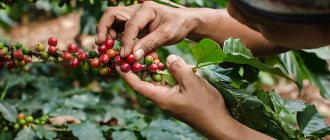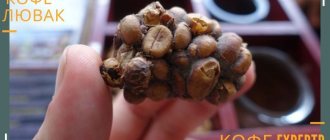Ethiopia is considered the birthplace of coffee, and Yemen has rightfully earned the fame of the first country in which coffee began to be cultivated and grown. This happened so long ago that experts are still arguing about whether the first Yemeni plantings of coffee trees appeared in the 12th or 14th centuries. Just like five hundred years ago, today’s coffee from Yemen is highly valued by fans of the aromatic drink. We propose to take an excursion to a country that produces only natural coffee and learn about all the intriguing features of the varieties and types of beans of Yemeni origin.
Mokhtar Alkhanshali
Modern Yemeni coffee owes a lot to Mokhtar Alkhanshali, who, despite the difficult political and economic situation in the country, managed to export invigorating beans to Europe and the USA. Mokhtar went into the fields with local farmers, taught them modern technologies seen in the West, and worked to improve the quality of coffee in Yemen. In 2020, he risked his life to escape the war-torn country to bring samples of the latest harvest to a coffee conference in Seattle. Coffee from Yemen instantly made a splash, scoring the highest number of points in blind testing.
Mokhtar was born in the United States to Yemeni immigrants. The young man’s ancestors were engaged in growing coffee, and in 2013 the young man decided to revive the family tradition. To achieve this, Mokhtar tirelessly shuttled between Yemen and the United States, establishing trade ties. The entrepreneur was helped by the fact that he spoke the Yemeni language and also shared the culture and traditions of local farmers. On the other hand, in the USA he learned advanced technologies, knew how to cultivate grain and conduct business more efficiently.
Mokhtar Alkhanshali
Now, due to difficulties with transportation and the use of virtually exclusively manual labor, the price of a cup of Port of Mokha brand coffee supplied by Mokhtar can reach up to $16. Thanks to this, farmers in Yemen earn 6-12 times more than their counterparts in neighboring Ethiopia.
Plantations that are five thousand years old
Several hundred years ago, coffee trees in Yemen began to be grown purposefully for the first time to produce a harvest of aromatic beans. For a long time, this country remained a monopolist in the trade of coffee beans. However, the cunning of competitors who craved coffee super-profits quickly deprived the country of its leading position.
The fact is that the climate and terrain of Yemen do not allow growing large crops. Some coffee plantings are just a few trees that miraculously stay on the mountain slopes. Constant problems with land reclamation, as well as a decrease in the total area of agricultural land, also reduce productivity. So, even on the previous scale, there is simply nowhere to grow coffee.
Yemen occupies a modest position in the fifth ten world coffee suppliers. About 7-8 thousand tons of coffee per year are supplied to the foreign market. The entire crop is organically grown Arabica. Many trees grow in the same places that were cultivated five or six hundred years ago. Older than them in age are probably only the natural coffee plantations of Ethiopia.
Yemeni farmers have preserved ancient technologies for growing and processing grains. They do not use chemical fertilizers, preferring to follow the same techniques that they inherited from their ancestors. The coffee beans are collected, dried on the flat roofs of houses, cleaned and winnowed. All operations are performed manually, usually by members of the same family. The only improvement that Yemenis allow themselves is greenhouses for growing seedlings and young seedlings.
Due to the fact that harvests are small, coffee beans from Yemen are quite expensive. Instant drinks are not produced from them. Even substandard, broken grains are sold, and at a very impressive price.
Why is Yemeni coffee so popular?
It's all about the special composition of the soils of this country. Typically, coffee in South America and Africa is grown on volcanic soils that are highly acidic. This greatly affects the flavor of the beans, giving them an obvious sourness. The composition of the soil on which the coffee tree grows determines the taste of the finished drink. For example, many Brazilian varieties have a strong medicinal smell due to their high quinine content, and some Guatemalan varieties have a spicy, smoky note due to the large amount of volcanic ash in the soil.
Coffee from Yemen has a pleasant, dense taste, practically devoid of acid. The drink is decorated with fruit and wine notes, which make the taste especially rich and varied. The depth of taste sensations is noted by everyone who has tried the drink. Dark color, persistent and strong aroma - these are the signs of real coffee from Yemen, for which it is highly valued.
Mocha
In modern interpretation, the term “mocha” means a mixture of coffee with hot chocolate or espresso with chocolate syrup. In fact, this is a unique variety of Yemeni coffee, named after the port city through which aromatic beans were transported to other countries.
Mocha coffee belongs to the Arabica class and is cultivated in the vicinity of the capital, Sana'a. Another name for the variety is Yemeni Udaini, it has a natural chocolate flavor, a price reaching up to $240 per pound and is considered one of the best coffees in the world.
Yemeni mocha
Adding to the confusion is Ethiopian Harrar coffee, which is also often marketed under the name “mocha” or “moka”. Despite the fact that the varieties are indeed similar, the Ethiopian counterpart is lighter in body.
Coffee traditions of Yemen
In Yemen, coffee is treated with special respect. Each family prepares it according to a unique recipe, which is never shared with anyone. If a person is offered a cup of aromatic drink as a guest, he cannot refuse it. Such actions amount to insult. Drinking coffee together is considered a gesture of friendship and trust.
Not all residents of the country prefer to prepare the drink the classic way. For quite a long period, not the grains, but the berries themselves were used to obtain coffee. They were dried and freed from the core, which was simply thrown away, considered unfit for consumption. This cooking option remains popular to this day.
In Yemen, it is customary to wash your hands and rinse your mouth before drinking coffee.
It is believed that only after performing these steps will you be able to fully enjoy the taste.
Characteristics of coffee from Yemen
Yemeni coffee has a rich bouquet with notes of tropical fruits, flowers and spices. There are varieties with earthy, woody and tobacco accents.
Types of Yemeni coffee:
- Udaini (Mocha);
- Dawairi;
- Tufahi;
- Bura'ai;
- Abu Sura.
In addition, there are literally hundreds of local names used in the home market, sometimes with dozens of designations for a single variety, and whether they refer to a bean type or region of origin can never be said with certainty. The beans are processed using the dry (or “natural”) method, when the coffee cherries are first dried in the sun (often right on the roofs of houses), and only then peeled from the pulp and skin.
The country's coffee industry is represented by small farms, most of the plantations are located on mountain terraces. Local grains tolerate drought well and produce abundant harvests even in hot climates.
Famous brands of Yemeni coffee: Volcanica, Port of Mokha, Sweet Maria's.
History and features of production
The first coffee plantations appeared in the country in 1100. This state was the first to export coffee products, but could not maintain the monopoly. Soon, coffee production became popular in many parts of the world, and Yemen lost its leading position.
An underdeveloped country with water supply problems could not cope with the competition. Already in the 17th century, plantation areas were reduced. In the 20th century, no more than 11 thousand tons of coffee fruits were grown annually in Yemen. Of this, about a third is consumed by state residents.
Despite this, Yemeni coffee continues to be valued around the world. It has an unsurpassed aroma and multifaceted taste.
Yemen is considered the only country where 100% organic Arabica beans are grown to this day.
Pesticides and chemical fertilizers are not used on the plantations. The fruits are collected by hand. After this, perform the following steps:
- For three days, the fruits are dried on dishes placed on the roofs of houses.
- After this, they are moved to a dark room.
- After a while, they are again laid out in the sun.
- Dried berries are cleaned using a millstone.
- The crop is then tossed so that the husks are collected at the edge. This makes it much easier to remove debris.
- The cleaned grains are placed in baskets.
The only innovation over the past 500 years is the construction of greenhouses. Tree seedlings are grown in them until transplantation.
Regions
- Bani Mattar. The local coffee is called Mattari, grows at an altitude of about 1400 meters, has a distinct sourness, wine notes and a complex fruity aroma.
- Hiraazi. The coffee is similar to Mattari, but lighter in body.
- Ismaili. Delicate and soft coffee with a berry flavor is produced here.
- Sanani. Coffee of lower quality compared to other regions is characterized by a medium body, a balanced profile, and a fruity taste with almost no sourness.
Mocha is a bean variety that can be cultivated in any region. Mocha Mattari is considered the most delicious.
Geography
Yemen is one of the most famous producing countries in the global coffee market, but not much is known about the geography of coffee production in Yemen.
Coffee plantings in Yemen are located in the western part of the country, east of Tihama, a narrow strip of desert stretching along the western coast of the Arabian Peninsula along the Red Sea. Coffee grows from the city of Saada in the north almost to the port of Aden on the southern coast. The famous port of Mokha, which gave the world such a popular coffee word as “mocha” (or “mocha”), is located here, in the southwest of Yemen. Moha is known as the main port of coffee export from Yemen from the 15th to 17th centuries, when Yemen was essentially the only coffee producer in the world.
The most dense coffee plantings are located immediately southwest of Yemen's capital, Sana'a. 30 kilometers from Sana'a is the Bani Matar district, where the famous Yemen Matari coffee is grown at an altitude of 2000 to 2500 meters above sea level with a rainfall of 600-900 mm per year.
Varieties of Arabica
Mutations of Typica, introduced to Yemen from Ethiopia, have occurred in the Yemeni highlands for centuries. Today, more than a dozen names of coffee grow here - matari, sanani, davarani, tufahi, harazi, ismaili, etc. There are several points of view on how many varieties of Arabica coffee there are in Yemen, which have significant differences among themselves. Most researchers, however, agree that there are four of them: Udaini, Dawairi, Tufahi and Burai. Some researchers also distinguish a variety of abu-sura. Most of the trees have much in common with udaini, as a result of which there is an assumption that it is udaini that is the ancestor of other varieties growing in Yemen.
Of these four varieties, only burai grows at altitudes of about 2500 meters, so it can be assumed that Yemen Matari is burai.
The names more familiar to our ears - matari, sanani, harazi, etc. - were formed on a geographical basis (Bani Matar, Sana and Kharaz, respectively).
Climate of Bani Matar
Yemen is located in the northern tropical zone and has an arid climate, but high in the mountains it can be quite humid. Bani Matar is cold and dry in winter, with temperatures dropping to almost zero degrees. In summer the air warms up to 30 degrees, humidity is moderate.
Obviously, the climate, which is quite harsh for Arabica, leaves its mark on the taste characteristics of Yemen Matari: the berry, resisting stress, forms a more intense taste.
Coffee in Bani Matar is grown in places such as the Boglan Valley, Beit Al-Razqi, Al-Ghudmah, Hayet Al-Jalb and Saih.











